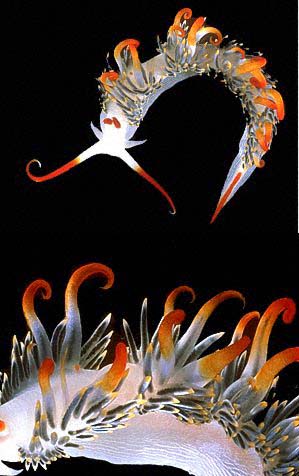
Moridilla brockii
Bergh, 1888
Order: NUDIBRANCHIA
Suborder: AEOLIDINA
Family: Glaucidae
DISTRIBUTION
Tropical Indo-West Pacific
PHOTO
Darwin Harbour, Northern Territory, Australia. May 1986. PHOTO: Bill Rudman.
RELATED TOPIC
Defensive coloration in sea slugs
The bright red tips to the cerata of this aeolid apparently warn potential predators of the presence of the cnidosac which contains the stinging nematocysts removed from the cnidarian food of Moridilla brockii. When disturbed, Moridilla puts on a spectacular 'startle' display, uncoiling the large rolled cerata and pointing them at the source of the disturbance. There are few anatomical reasons to retain Moridilla as a genus distinct from Phidiana.
References:
• Rao, K.P. (1965) Moridilla brockii Bergh 1888, redescribed with notes on anatomy and early development. Journal of the Marine Biological Association, India, 7(1): 61-68.
Rudman, W.B., 1998 (October 14) Moridilla brockii Bergh, 1888. [In] Sea Slug Forum. Australian Museum, Sydney. Available from http://www.seaslugforum.net/find/moribroc
Related messages
Moridilla brockii from sthn Queensland
November 26, 2008
From: Gary Cobb
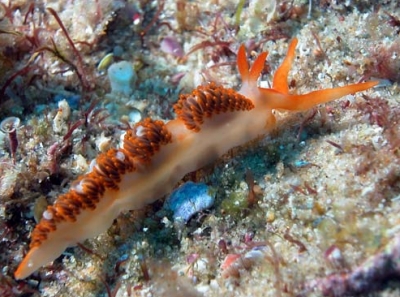
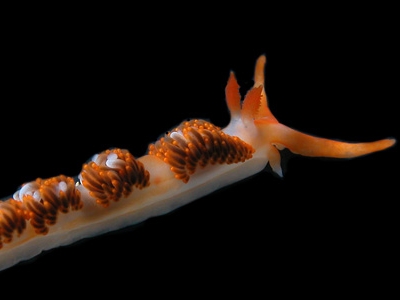
Concerning message #21982:
Hi Bill and everyone!
During David Mullins and I 2 hour dive at the north west side the Flinders Reef north or Moreton Island we found under two rocks Moridilla brockii.
You can see the extra long rolled cerata which are white in these animals. They do unroll and thrash aroud when disturbed!
Locality: Flinders Reef, Moreton Island, 16 m, Queensland, Australia, Pacific Ocean, 15 November 2008, Subtidal. Length: 50-55 mm. Photographer: Gary Cobb and David Mullins.
Cheers
Gary
gary@nudibranch.com.au
Cobb, G.C., 2008 (Nov 26) Moridilla brockii from sthn Queensland. [Message in] Sea Slug Forum. Australian Museum, Sydney. Available from http://www.seaslugforum.net/find/22054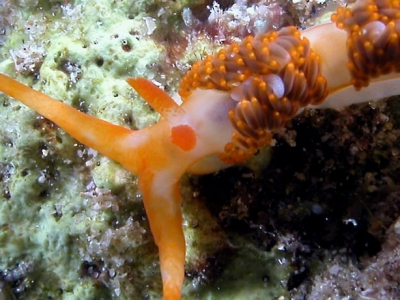
Thanks Gary & Dave,
Glad you saw the classic 'cerata waving' - it can be quite a spectacular display which we hypothesise is a defensive display.
Best wishes,
Bill Rudman
Moridilla brockii from Philippines
October 22, 2008
From: Marcel Tanke
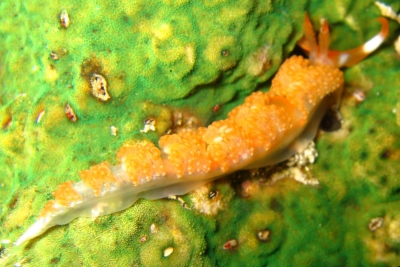
Dear Bill,
Attached a couple of pictures of Moridilla brockii from the Philippines; which I didn't see in the forum list for it yet. Erwin Koehler helped to ID it.
Locality: Moalboal, Cebu Island, 10-15 meters, Philippines, 2 May 2008, Reef. Length: 5 cm. Photographer: Marcel Tanke.
Best regards,
Marcel
marceltanke@cs.com
Tanke, M.A., 2008 (Oct 22) Moridilla brockii from Philippines. [Message in] Sea Slug Forum. Australian Museum, Sydney. Available from http://www.seaslugforum.net/find/21982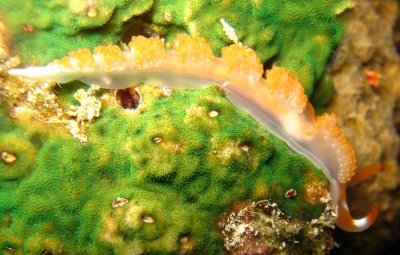
Dear Marcel,
I would agree with Erwin. Although I can't see the long inner cerata, the general shape, colour and clusters of cerata fit this species. It appears to be widespread throughout the tropical Indo-West Pacific.
Best wishes,
Bill Rudman
Moridilla brockii from Komodo
April 22, 2008
From: Natasja Vandeperre

Hello Bill,
I think this is Moridilla brockii. You don't seem to have that many records of this one yet.
Locality: Komodo, Indonesia, May 2007. Photographer: Karen Verwulgen
Greetings,
Natasja
postmaster@naaktslakken.be
Vandeperre, N., 2008 (Apr 22) Moridilla brockii from Komodo. [Message in] Sea Slug Forum. Australian Museum, Sydney. Available from http://www.seaslugforum.net/find/20818Dear Natasja,
Yes this is Moridilla brockii
Bill Rudman
Re: Colour form of Cuthona yamasui
February 22, 2008
From: Samson Tan
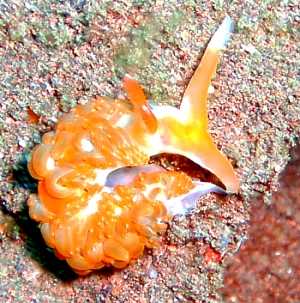
Concerning message #21277:
Hi Bill
This animal you have identified as a variation of Cuthona yamasui looks very close to the animal in the enclosed photos. I saw this slug during my last diving trip at Bali on 25th October 2007. It looks similiar to Phidiana sp. However, it does not match 100% the characteristic of Phidiana militaris, P. indica or P. hiltoni.
Locality: Seraya coast, near Tulamben, 12 metres, Bali, Indonesia, Lombok Straits, 25 October 2007, rocky shore, volcanic sendiments. Length: 60 mm. Photographer: Samson Tan.
Samson Tan
sos001y@yahoo.com
Tan, S., 2008 (Feb 22) Re: Colour form of Cuthona yamasui. [Message in] Sea Slug Forum. Australian Museum, Sydney. Available from http://www.seaslugforum.net/find/21057
Dear Samson,
It certainly has similarities in general colour but your differs in a number of features. Firstly the cerata in Cuthona yamasui are ranged in regularly spaced rows and each ceras is about the same size. In your animal the rows of cerata are clumped into groups with spaces in between each group. Also in each group the cerata vary greatly in size, being very small near the outside and long and recurved in the inside of each row. Your animal is indeed a phidianid, as you suspected, and almost certainly a colour form of Moridilla brockii
Best wishes,
Bill Rudman
Moridilla brockii eggs from Ningaloo
February 28, 2006
From: Kristin Anderson
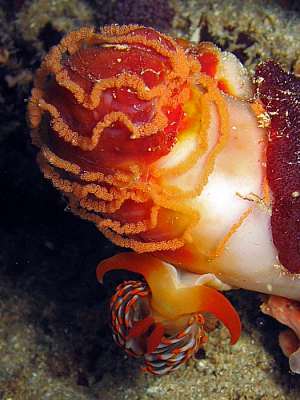
Didn't see any Moridilla brockii with eggs on the forum so thought you might find this of some use.
Locality: Ningaloo Reef, 14m, Western Australia, Indian Ocean, Ningaloo Reef, 04 February 2004, limestone and hard coral reef. Length: 6 cm. Photographer: Kristin Anderson
Kristin Anderson
kristin@OceansByAnderson.com
Anderson, K.J., 2006 (Feb 28) Moridilla brockii eggs from Ningaloo. [Message in] Sea Slug Forum. Australian Museum, Sydney. Available from http://www.seaslugforum.net/find/15846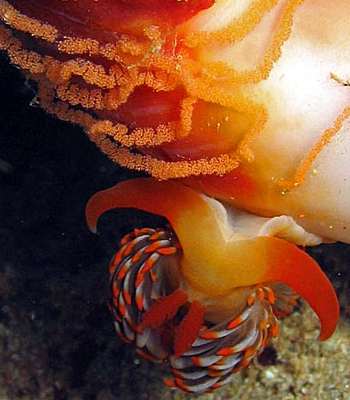
Thanks Kristin,
Bill Rudman
Moridilla brockii from northeastern Australia
October 6, 2005
From: Daniel J. Foote
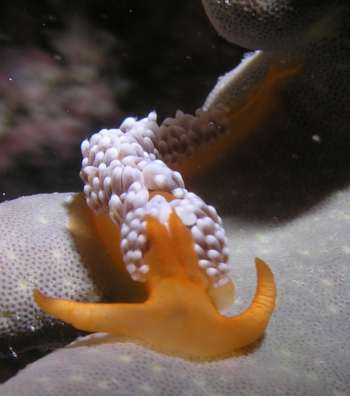
Found in about 12 metres at Bowden Reef off Townsville
Locality: Bowden Reef, Townsville, Qld, Australia. Depth: 12 m. Length: 3 cm. 30 August 2005. Photographer: Daniel J. Foote
Daniel Foote
pelagic_dan@yahoo.co.uk
Foote, D.J., 2005 (Oct 6) Moridilla brockii from northeastern Australia. [Message in] Sea Slug Forum. Australian Museum, Sydney. Available from http://www.seaslugforum.net/find/14908Dear Daniel,
I can't see too much from your photo about the shape and size of the cerata, but I suspect the inside cerata in the back row of each clump of cerata will be long and curled. At present I am identifying all with this shape as Moridilla brockii. Yours looks very like the original description. It is possible there may be more than one species involved but so far I can't see any difference in radula shape and general body shape.
Best wishes,
Bill Rudman
Moridilla brockii from Bali
May 31, 2005
From: Douglas Hansen
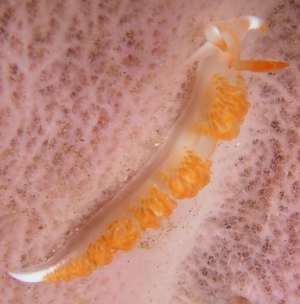
We found this nudibranch during a night dive in northern Bali near Tulamben. At first we thought it was a Flabellina, but the cerata don't seem consistent with other Flabellina. Any ideas as to what species it is?
Locality: Bali, near Tulamben, Indonesia. Depth: 30 feet. Length: 1 inch. 25 June 2004. muck and rubble. Photographer: Carmelita Hansen
Thank you
Douglas Hansen.
mhel0323@sbcglobal.net
Hansen, D.S., 2005 (May 31) Moridilla brockii from Bali. [Message in] Sea Slug Forum. Australian Museum, Sydney. Available from http://www.seaslugforum.net/find/13908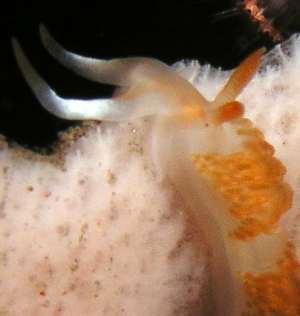
Dear Doug,
This is Moridilla brockii
Best wishes,
Bill Rudman
Moridilla brockii from NW Australia
July 26, 2002
From: Steven Tuften
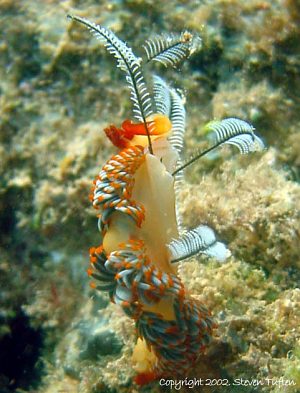
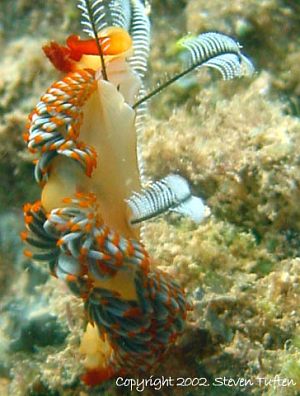
Dear Bill,
I took this photo at Bundegi Marine sanctuary, Exmouth Cape, northwestern coast of Western Australia, on 7 May 2002 in the early afternoon in about 7 metres. Water temperature ~28C. Size was 5-6cm
Cheers,
Steve
stuften@optushome.com.au
Tuften, S., 2002 (Jul 26) Moridilla brockii from NW Australia. [Message in] Sea Slug Forum. Australian Museum, Sydney. Available from http://www.seaslugforum.net/find/7631Thanks Steve,
This is the aeolid Moridilla brockii. I guess it is feeding on the feathery hydroid it is coiled around. growing to about 4cm, this is quite a large aeolid, and as you will see in the Fact Sheet, and in the other messages on this page, it has a spectacular habit of waving its largest cerata round vigorously when disturbed, presumably to startle away potential predators. This pale blue and brownish orange colour pattern is more typical of the species, the white and bright red form I have photographed in Darwin, being much less common.
best wishes,
Bill Rudman
Moridilla brockii from Western Australia
October 2, 2000
From: Drew Taylor
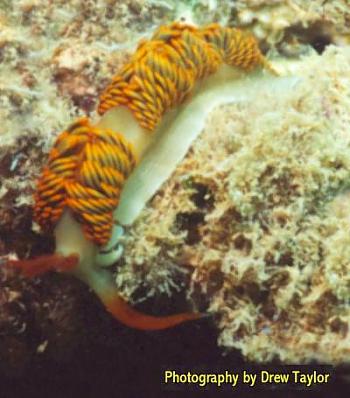
Bill,
This is another photo taken at Bundegi Reef in Exmouth, Western Australia. I am having problems identifying this one, can you help me out?
Drew Taylor
orcaunderwater@nwc.net.au
Taylor, D., 2000 (Oct 2) Moridilla brockii from Western Australia. [Message in] Sea Slug Forum. Australian Museum, Sydney. Available from http://www.seaslugforum.net/find/3073Dear Drew,
This is Moridilla brockii, one of a group of aeolids which appear quite aggressive when disturbed, 'bristling' their cerata in a show of bravado. as you'll see at the top of the page, in Moridilla the innnermost cerata in each row are much longer than the others, lying coiled like a spring, only uncoiling when the animal feels threatened. Have a look at the pages on the aeolid cnidosac and on defensive coloration in nudibranchs for information on aeolid defence methods.
Best wishes,
Bill Rudman.
Moridilla brockii from Maldives
October 22, 1999
From: Erwin Koehler
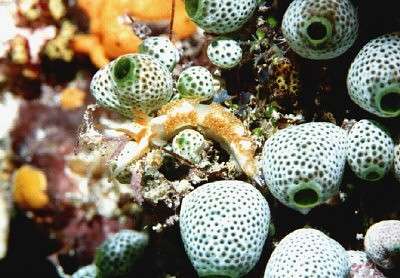
Bill,
Here is Moridilla brocki (or is it spelled Moridilla brockii?) from the
Maldives, Ellaidhoo Island, housereef,
date November 21, 1996, size 8 mm, depth 18m, nightdive.
This one did not like the light - as soon as the pilot-light of my flash-gun pointed at it, it disappeared between the sea squirts.
Erwin
Medslugs.Koehler@t-online.de
Koehler, E., 1999 (Oct 22) Moridilla brockii from Maldives. [Message in] Sea Slug Forum. Australian Museum, Sydney. Available from http://www.seaslugforum.net/find/1442Dear Erwin,
Thanks for the photo. You are right with the spelling, it's brockii not brocki. I'm afraid I used Russell's Index Nudibranchia instead of Bergh's original description. I'll make the necessary corrections.
It's interesting how sensitive some of these active hunting aeolids can be. Perhaps their nervous system is wired for a fast response. They certainly can't be called 'sluggish'.
Bill Rudman.
